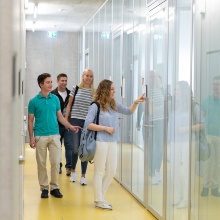Ancient Indian philosophers defined a ‘Guru’ or mentor as someone who dispels one’s deep darkness of ignorance and confusion by illuminating the path to progress with the light of their guidance. Many a time in a PhD student’s journey through the realms of doctoral research, there are instances of confusion when there appears a distinction between what one is supposed to be doing, where one’s interests lie, and the direction one’s research is actually heading towards. Such instances can leave a student feeling lost and bewildered.
Of course, a PhD student’s primary mentor is their supervisor and regular discussions with them can be a wonderful way to stay on track and not get vexed by vacillations during the course of one's research. However, the scope of one’s interactions with their supervisor seldom goes beyond one’s project and its implications.
A peer network
Fortunately for the PhD students of Uni Stuttgart, the university’s graduate academy GRADUS recently came up with a new initiative: the ExploreScience program. ExploreScience is designed to help doctoral students advance themselves in their chosen career paths. The program consists of two sections, group mentoring and peer mentoring. Both being new initiatives, the peer mentoring section is scheduled to begin in October this year and the first group mentoring program began last December. While the peer mentoring program aims to establish a peer network amongst PhD students to enable themselves to learn from each other, group mentoring is much more structured. Mentees are grouped based on similar interests and chosen career paths and mentors with significant experience in those fields are assigned to each group. The groups meet at regular intervals to discuss relevant themes and the mentor guides mentees through their chosen paths. For the benefit of international students, there are separate groups where discussions happen exclusively in English. For people like me who only have a rudimentary understanding of the German language, this is a very welcome feature as otherwise the language barrier would have made effective discussions well-nigh impossible!
I have had the opportunity to be a part of the inaugural edition of the group mentoring program and my experience with it so far has been immensely informative and helpful. It all begins with a call for applications on the GRADUS website. Applicants have the option of choosing between three different career paths: Business, Society, and Science. Students who want to pursue a career in the industry in their respective fields, or even entrepreneurship based on their research, can opt for the Business stream. Networking events are also organised within the ExploreScience program for all the people involved to meet each other, share experiences, and build up contacts. During one of these sessions, I had the opportunity to interact with the business group and found out that their mentor was a successful entrepreneur himself!
I wanted guidance on effectively completing my research
Those who wish to utilise their expertise to solve pressing problems in society or give back to society in general, opt for the Society stream where a mentor involved in social causes guides them in shaping a career out of their lofty ideals of serving society. The final path and the one I opted for is the Science stream in which mentee groups have an experienced academician as a mentor who guides them on matters involving the successful completion of doctoral research and pursuit of a career in academia.
In case applicants are unable to decide upon a particular career path, they also have the option of asking Dr. Cornelia Frank, the consultant for doctoral researchers at GRADUS, for advice. Every Researcher in the university is entitled to five sessions of career counselling with Dr. Frank. I myself was quite indecisive at first as my interests lay in industry and entrepreneurship over the long term, but I wanted guidance on effectively completing my research and thesis in the short term. I was also very curious to learn about how the academic system worked in Germany which I had heard was very different from most other places in the world. Ultimately after a lot of consideration I opted for the Science stream.
Strongly recommended
Being in a diverse international group with students from Egypt, Kenya, Nigeria, and India, was in itself an interesting experience with exposure to a plethora of perspectives and ideas. Our mentor, a Professor at the university, gave us valuable insights on the entire academic process right from publishing one's first research paper during PhD studies up to a full tenured professorship in Germany as well as abroad. In particular, we received invaluable guidance on effectively planning one's research to achieve thesis objectives while maintaining a healthy work-life balance, an important struggle that almost every PhD student faces. As I am an international student who moved to a different country for the first time for my PhD, this mentoring program was a blessing in disguise for me. It gave me a much better understanding of the system that I was in, and helped me reorient and integrate myself into it while structuring my future career path in a lucid manner.
I would strongly recommend every PhD student in the university who thinks he or she is in need of some guidance or mentoring, to get in touch with GRADUS and apply for the ExploreScience program. For further information about these programs and the application procedures for the next editions of the program, students can get in touch with Jürgen Hädrich who is doing a great job of coordinating the mentoring programs and who I’m sure would be most willing to answer questions about the program.
Pavan
Comment on this article
Your email address will not be published.



